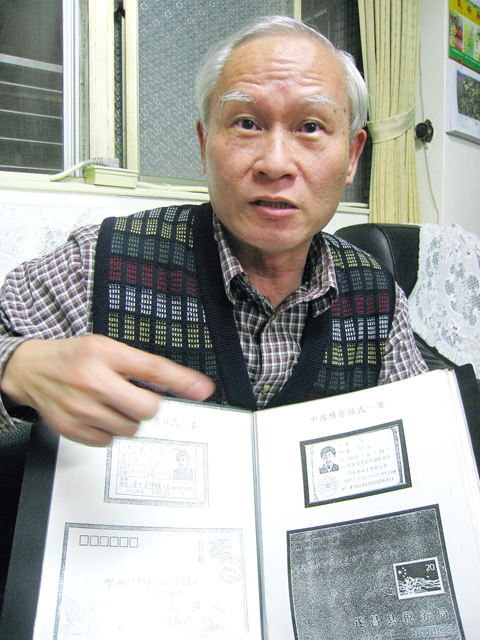A man who once was an avid stamp collector has turned his energies toward a different kind of collectible — surnames. Over the past decade, he has collected more than 200 rare Chinese surnames from friends, relatives, coworkers and even strangers he found in a telephone directory.
Kuo Chih-hsiang (郭智祥) collects surnames by sending an envelope to a person with an unusual surname and have him or her write back with a photocopy of any document that can prove that person’s identification.
Kuo said his surname collection began more than 10 years ago when he asked a Chinese man, Yao Ke (要可), with whom he intended to exchange stamps at the time, to prove his unusual family name. A month later, Kuo received a copy of Yao’s ID card via mail, which inspired him to start collecting rare Chinese surnames.

PHOTO: YANG JIOU-YIN, TAIPEI TIMES
At first, Kuo collected unusual surnames from friends who were also stamp collectors by exchanging postal products. Later, he started looking up strange surnames in a telephone directory. However, by doing so, he said he scared many people as he insisted on obtaining photocopies of their ID cards. At long last, he began accepting other types of identification, such as driver’s licenses, student IDs, diplomas, club membership cards, hospital receipts and even bank statements.
To complete the process, Kuo said he would first ask a person with a rare family name for his or her address and then send them a self-stamped envelope. After that, he would either visit in person to pick up the envelope or have the person mail it back.
Some of the rare surnames Kuo has collected include Hu (虎, tiger), Yi (蟻, ant), Shui (水, water), Yun (雲, cloud), Suo (鎖, lock), Dan (但, but) and Mai (買, buy).
Some of the surnames were so rare that the character could not be found on a computer, he said.
Pang Shou-neng (逄守能), a local postmaster in Taichung City, remembered that Kuo had to travel from Taipei to Taichung to meet him to pick up the necessary information for his collection.
“Seeing him so committed, I decided to make friends with him,” Pang said. “But since scams have become so prevalent, if he had asked me for a copy of my ID back then, I wouldn’t have given it to him.”
An elderly woman surnamed Tse (策) told Kuo that very few people had the surname Tse, adding that she was worried it would soon become extinct.
Kuo said this made him realize that his efforts were valuable.

A preclearance service to facilitate entry for people traveling to select airports in Japan would be available from Thursday next week to Feb. 25 at Taiwan Taoyuan International Airport, Taoyuan International Airport Corp (TIAC) said on Tuesday. The service was first made available to Taiwanese travelers throughout the winter vacation of 2024 and during the Lunar New Year holiday. In addition to flights to the Japanese cities of Hakodate, Asahikawa, Akita, Sendai, Niigata, Okayama, Takamatsu, Kumamoto and Kagoshima, the service would be available to travelers to Kobe and Oita. The service can be accessed by passengers of 15 flight routes operated by

MORE FALL: An investigation into one of Xi’s key cronies, part of a broader ‘anti-corruption’ drive, indicates that he might have a deep distrust in the military, an expert said China’s latest military purge underscores systemic risks in its shift from collective leadership to sole rule under Chinese President Xi Jinping (習近平), and could disrupt its chain of command and military capabilities, a national security official said yesterday. If decisionmaking within the Chinese Communist Party has become “irrational” under one-man rule, the Taiwan Strait and the regional situation must be approached with extreme caution, given unforeseen risks, they added. The anonymous official made the remarks as China’s Central Military Commission Vice Chairman Zhang Youxia (張又俠) and Joint Staff Department Chief of Staff Liu Zhenli (劉振立) were reportedly being investigated for suspected “serious

ENHANCING EFFICIENCY: The apron can accommodate 16 airplanes overnight at Taoyuan airport while work on the third runway continues, the transport minister said A new temporary overnight parking apron at Taiwan Taoyuan International Airport is to start operating on Friday next week to boost operational efficiency while the third runway is being constructed, the Ministry of Transportation and Communications said yesterday. The apron — one of the crucial projects in the construction of the third runway — can accommodate 16 aircraft overnight at the nation’s largest international airport, Minister of Transportation and Communications Chen Shih-kai (陳世凱) told reporters while inspecting the new facility yesterday morning. Aside from providing the airport operator with greater flexibility in aircraft parking during the third runway construction,

Taiwanese and US defense groups are collaborating to introduce deployable, semi-autonomous manufacturing systems for drones and components in a boost to the nation’s supply chain resilience. Taiwan’s G-Tech Optroelectronics Corp subsidiary GTOC and the US’ Aerkomm Inc on Friday announced an agreement with fellow US-based Firestorm Lab to adopt the latter’s xCell, a technology featuring 3D printers fitted in 6.1m container units. The systems enable aerial platforms and parts to be produced in high volumes from dispersed nodes capable of rapid redeployment, to minimize the risk of enemy strikes and to meet field requirements, they said. Firestorm chief technology officer Ian Muceus said